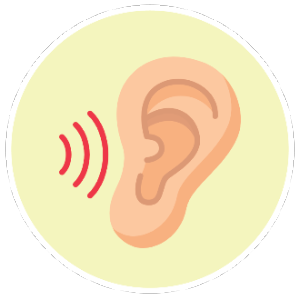
Auditory (Hearing)
- Easily bothered by ordinary sounds
- Responds negatively to loud noises
- Appears not to hear certain sounds
- Produces certain sounds repeatedly
The sensory system is the part of our body that helps us perceive and understand the world around us through our senses. It includes our five main senses: sight, hearing, taste, smell, and touch. In addition to that, there are three other important senses that are less commonly known but play a crucial role in our system: the vestibular (balance) sense, proprioception (external body awareness), and interception (internal body awareness).
The sensory system helps us gather information from our environment and make sense of it, enabling us to interact with the world and learn from our experiences. For sensory seekers, sensory avoiders, over-responders, or under-responders, you can modify a variety of sensory solutions. Understanding each sense's needs and the appropriate potential solutions is necessary for the optimal adaptation of solutions.

The sensory system functions by utilizing specialized sensory receptors located throughout the body, which detect specific types of sensory information such as light, sound, touch, taste, and smell. These receptors form sensory organs such as the eyes, ears, skin, taste buds, and olfactory receptors. When a sensory receptor detects a stimulus, it generates an electrical signal that is transmitted through sensory nerves or tracts to the brain. In the brain, these signals are processed and interpreted, allowing us to perceive and understand our environment.

Sensory system issues disrupt the normal functioning of sensory processing. This can result in difficulties with sensory sensitivity, focus, and self-regulation. Individuals may experience hypersensitivity or hyposensitivity to stimuli, sensory overload, coordination problems, and increased anxiety.